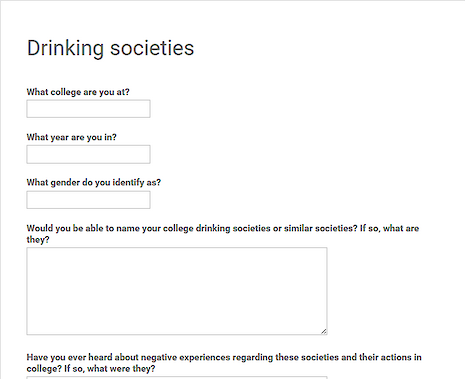WomCam launches survey into drinking societies’ behaviour
Drinking societies have been frequently criticised for their treatment of female students and sexist behaviour

A survey aiming to collect information on students' negative experiences of drinking societies has been initiated by the Cambridge University Students' Union.
The questionnaire, available here, is one of the first acts by the newly-elected Women's Officer Charlotte Chorley. The form asks students to name their college drinking societies, in an apparent attempt to discern the notoriety of Cambridge’s most infamous groups, and then outline any negative experiences they have heard regarding such societies either inside or outside of college.
It goes on to ask whether the respondent personally experienced such negative experiences and concludes by enquiring after the respondent’s perceptions of drinking society members.
Drinking societies and the actions of their members across multiple colleges have recently been the subject of increased scrutiny. Last year, colleges including Emmanuel, Churchill and St Catherine’s forcibly disbanded and suspended their societies.
In 2009, Varsity investigated some of the notorious initiation ceremonies following an outcry in the national press about some of the behaviour towards, and tasks done by, new members.
While petitions to see such societies banned have gained some prominence, a 2nd year Selwynite speaking to Varsity countered that this is an “easy” but “incorrect solution” because it “allows you to point the finger of blame at an obvious target and not the source of the problem: individual offenders.”
For CUSU, however, tackling institutionalised sexist behaviour within drinking societies seems to be the primary aim.
Examples of such behaviour include the Magdalene Wyvern’s infamous jelly-wrestling, which was branded as “clearly sexist, misogynistic and completely inappropriate” by a petition to stop the ritual. And in 2014, Varsity reported that Selywn’s ‘Templars’ society used misogynistic language in Facebook conversations in which they rated girls they had slept with.
However, CUSU's survey has been subject to criticism due to a perceived bias within the questions. It has been pointed out, for example, that the questions focus overwhelmingly on the negative aspects of such societies and do not guide responders towards detailing any positive experiences.
A second year veterinary student argued that the questionnaire was “clearly designed to give [Chorley] the results she wanted” and that it should be a genuine survey of the general university population instead of a “a tool she can use to stop drinking societies”.
Speaking to Blewswire, Chorley defended the survey, arguing that its aim was achieving “a greater understanding of how these societies operate, and their impact on student life and experience”. And while speaking to TCS, she explained that CUSU has launched the questionnaire in response to “anecdotes and messages relating to negative experiences of drinking societies”.
Chorley added: “The questions are framed in such a way as to get people to open up about these experiences, and if people have positive ones, there is the space to discuss those too.”
The survey’s release comes shortly after CUSU’s Mind the Gap report, which received national coverage for its findings on the gender attainment gap in Cambridge University examinations.
 News / Judge Business School advisor resigns over Epstein and Andrew links18 February 2026
News / Judge Business School advisor resigns over Epstein and Andrew links18 February 2026 News / Gov grants £36m to Cambridge supercomputer17 February 2026
News / Gov grants £36m to Cambridge supercomputer17 February 2026 News / Hundreds of Cambridge academics demand vote on fate of vet course20 February 2026
News / Hundreds of Cambridge academics demand vote on fate of vet course20 February 2026 News / CUCA members attend Reform rally in London20 February 2026
News / CUCA members attend Reform rally in London20 February 2026 News / Union speakers condemn ‘hateful’ Katie Hopkins speech14 February 2026
News / Union speakers condemn ‘hateful’ Katie Hopkins speech14 February 2026










